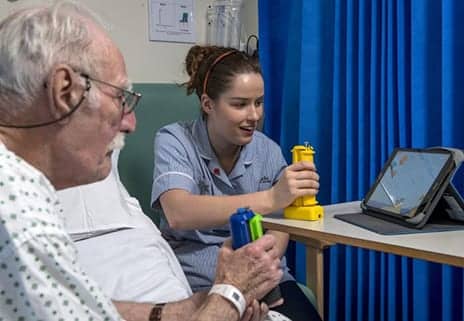
The video game Balloon Buddies aims to enable healthy volunteers to play with patients with physical impairments as part of their rehabilitation. (Photo courtesy of Imperial College London)
Balloon Buddies is a video game designed by researchers at Imperial College London to help stroke patients and others with musculoskeletal injuries, arthritis, or cerebral palsy to play with healthy cohorts as a form of rehabilitation.
The point of the game is to balance a ball on a beam, which is lifted at each of its ends by balloons controlled by the players. Points are awarded according to how well the players vary the height of the beam so that the ball collides with moving targets. Players are also required to work together to keep the beam horizontal so that the ball doesn’t roll off the platform.
The game, which uses animation, sounds, and vibration-feedback, is played using a wireless handgrip called a GripAble, which is engineered to enable people with arm weakness to control video games on any standard tablet device.
According to the researchers, in a news story from Imperial College London, Balloon Buddies is designed to level the playing field by allowing healthy participants to support the less abled player. This type of collaboration makes it more rewarding for the less-abled partner, more challenging for the better partner, and overall more fun for both, as they have to continuously work together to score points.
“Video games are a great way of providing repetitive exercise to help patients recover from debilitating illnesses. However, most games are designed for users to play on their own, which can actually discourage and isolate many patients,” says Dr Michael Mace, lead author of a study about the game, published in the Journal of NeuroEngineering and Rehabilitation.
“We developed the Balloon Buddy game to enable patients to train with their friends, family or caregivers in a collaborative and playful manner. The technology is still being developed, but we have shown that playing jointly with another individual may lead to increased engagement and better outcomes for patients,” adds Mace, from the Department of Bioengineering at Imperial College London, in the news story.
In their study, the research team tested the game using 16 patients with arm weakness following a stroke, teamed with a healthy volunteer, over a 3-month period, at Charing Cross Hospital, which is part of Imperial College Healthcare NHS Trust. They previously tested the game using 16 pairs of healthy participants with different baseline abilities.
The team will now carry out a larger study to examine whether the game leads to more efficient learning, and to examine if patients are more motivated to train for longer periods. They will also explore social implications of interaction such as the effect of patients playing with a relative versus a stranger, as stated in the news story.
[Source: Imperial College London]





Hello,
Thank you for this interesting publication.
Do you know id there is a way to buy the vídeo game and the control?
BR,
Florian